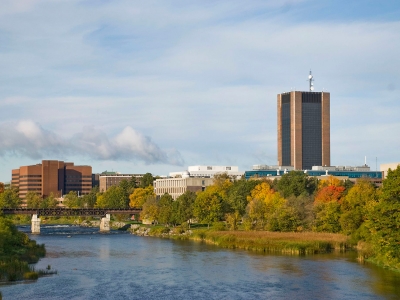Carleton University’s Lenore Fahrig, professor in the Department of Biology, has been awarded a 2021 Guggenheim Fellowship by the John Simon Guggenheim Memorial Foundation to study the importance of small natural areas in maintaining biodiversity, a project that could have profound implications for how the world approaches conserving species.
The Guggenheim Fellowships are awarded each year to a diverse group of writers, scholars, artists and scientists. Fellows are drawn from a broad range of scholarly disciplines and artistic fields
“We are very proud of Prof. Fahrig’s groundbreaking research in conservation biology,” said Rafik Goubran, vice-president (Research and International). “We are pleased to see her years of work recognized with this prestigious fellowship. As a highly-cited researcher, Fahrig’s dedication to her research and students exemplifies the leadership we value at Carleton.”
Appointed on the basis of prior achievement and exceptional promise, successful candidates were chosen through a rigorous peer-review process from thousands of applicants. Since its establishment in 1925, the John Simon Guggenheim Memorial Foundation has granted nearly $400 million in fellowships to more than 18,000 individuals, including scores of Nobel laureates, Fields Medalists, poets laureate, members of the national academies, winners of the Pulitzer Prize, Turing Award, Bancroft Prize, National Book Award and many other internationally recognized honours.
“I am absolutely thrilled to receive a Guggenheim Fellowship,” said Fahrig. “It’s a huge honour, and I’m really looking forward to spending quality time on an exciting new research project.”
Fahrig will test the critical, longstanding assumption in conservation biology that preservation of large-contiguous natural areas is needed to conserve threatened species. The results will be profoundly consequential, particularly if she finds that this assumption is incorrect. This would completely oppose the current perception and practice in conservation, which considers small natural areas to have low value and typically ignores their protection. It would imply that this practice places many species at risk of extinction, and it would support a paradigm shift to include a focus on many small natural areas in conservation planning.
About Carleton University
Located in the nation’s capital, Carleton University is a dynamic research and teaching institution with a tradition of leading change. Its internationally recognized faculty, staff and researchers provide more than 32,000 students with academic opportunities in more than 65 programs of study. Carleton’s creative, interdisciplinary and international approach to research has led to many significant discoveries and creative works. As an innovative institution, Carleton is uniquely committed to developing solutions to real-world problems by pushing the boundaries of knowledge and understanding daily.
About the Guggenheim Fellowships
Created by Senator Simon and Olga Guggenheim in memory of their son, the Guggenheim Fellowship program remains a significant source of support for artists, scholars in the humanities and social sciences, and scientific researchers. In addition to the generous support of Simon and Guggenheim, new and continuing donations from friends, trustees, former fellows, and other foundations have ensured that the John Simon Guggenheim Memorial Foundation will maintain its historic mission.
Media Contact
Steven Reid
Media Relations Officer
Carleton University
613-265-6613
Steven.Reid3@carleton.ca
Follow us on Twitter: www.twitter.com/Cunewsroom
COVID 19 Updates: https://newsroom.carleton.ca/coronavirus-covid-19/messages/
Thursday, April 8, 2021 in News Releases
Share: Twitter, Facebook



